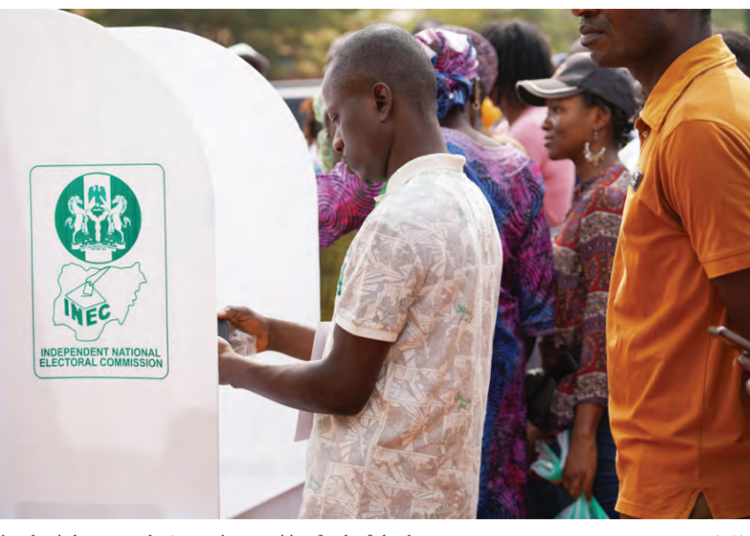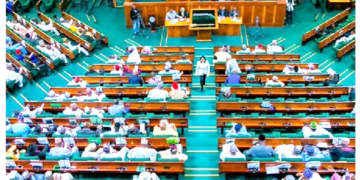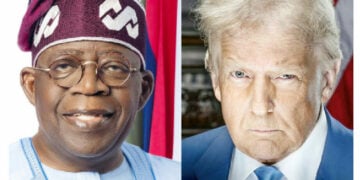Political parties, civil society organisations (CSOs) and top political scientists have expressed the concern that unless ideological dearth and the inconsistency in party manifesto implementation are tackled, quality governance, especially in states, would remain elusive.
Speaking to LEADERSHIP Sunday, they blamed the failed political party system for the prevailing situation.
They recalled that each political party in the Second Republic had a unified ideology and a clear manifesto which was implemented by the party’s government at all tiers.
They observed that political parties in the present dispensation lack political ideology and its members are too undisciplined to ensure the implementation of their manifesto, even in states they control.
Lamenting the capture of parties by presidents and governors since the return to democracy in 1999, the analysts noted that campaign promises tailored after the ambition of elected office holders now take the place of party manifestos.
While political parties in the First Republic were adjudged to be more regionally inclined, a deliberate attempt was made at forging national parties in the Second Republic.
In that republic (1979–1983), the major political parties in Nigeria were the Greater Nigerian People’s Party, (GNPP), the National Party of Niger (NPN), Nigeria Advance Party (NAP), Nigerian People’s Party (NPP), People’s Redemption Party (PRP) and Unity Party of Nigeria (UPN).
Although the parties were clearly ideologically distinct, the UPN and PRP were regarded as having more robust and clear manifestos, while the UPN was acknowledged as being more consistent in implementing its manifesto.
The party’s manifesto was built around four cardinal programmes: free education from nursery to tertiary level, free health services, integrated rural and community development, and full and sustainable employment. These programmes were religiously followed in states where they held sway, namely, Lagos, Oyo, Ogun, Ondo, and Bendel.
In the current dispensation, attempts at uniformity in manifesto implementation have been vague, LEADERSHIP Sunday reports.
LEADERSHIP Sunday recalls that moves by state governors in the past to undertake a peer review system, under the platform of the Nigeria Governors Forum, –failed to see the light of day.
While the ruling All Progressives Congress (APC) and the opposition Peoples Democratic Party (PDP) still have their governors’ forum platforms, concerns have been raised about the lack of uniform implementation of key party manifestos and the continuation of party programmes by succeeding administrations of the same party, which leads to abandoned policies.
This situation has become more precarious with the defection of governors from their parties.
Parties Since 1999 Are Mere Vehicles To Win Elections;
We Won’t Allow Such Anymore – ADC
The national publicity secretary of the African Democratic Congress (ADC),
Malam Bolaji Abdullahi, told LEADERSHIP Sunday that the crisis of party manifestos not being uniformly implemented in states controlled by one party reflects a more fundamental problem.
He said that since the beginning of the Fourth Republic, parties have become congenitally weak and have served merely as platforms for politicians to contest elections.
“So unlike the parties of the Second Republic, which built firmly on clear ideologies, policies, and programmes, parties in this republic became nothing more than special-purpose vehicles for elections. So, because they are not strong, they are unable to impose their authority or ideology on individual politicians. And that’s why politicians wait to get the party ticket and commission a consultant to provide or develop a manifesto they would probably not read themselves.
“So when you have six states under a party and each producing their own manifesto without any ideological anchor from the party, then you find this kind of dissonance, disconnection, or disparity abound.”
He said that in the Second Republic people voted for parties because they knew what they were going to get.
“And that’s why you see people like the late Chinua Achebe joining the PRP because that’s the party he believed exemplifies his own personal ideology and principles.”
He said that to correct the situation, parties firmly rooted in clear policies, programmes, and manifestos must be built.
“If you don’t have that, the kind of things we see will continue to happen,” hen said.
He also lamented the policy discontinuity in the system, adding that because parties have failed to impose their authority, every governor wants to do their own thing.
“But if you recall, the ADC National Chairman, Senator David Mark, said that we are building a party where it will not be left to the discretion of anybody elected on the platform of ADC to do what they like with power. We are going to, from day one, hand our elected officials a clear blueprint,” he said.
He said that if parties can develop their blueprint of governance and their vision of society, whoever gets into office must then implement the party’s programmes – as was seen in the Second Republic under the UPN states.
He said the solution is to strengthen political parties and ensure they do not yield to the whims and caprices of strong individuals.
“Now we don’t have politicians who are rooted in parties, we have parties who are amenable to the whims and caprices of politicians. We see a case of the tail wagging the dog instead of the other way round,” he added.
Why Political Parties Fail To Enforce Uniform Manifesto Implementation – IPAC
The Inter-Party Advisory Council (IPAC) has offered an insight into the reasons behind this democratic shortfall and has proffered a pathway to redemption.
In an exclusive position shared with LEADERSHIP Sunday, IPAC national chairman Dr Yusuf Mamman Dantalle explained that party manifestos — which serve as the ideological and policy contract between political parties and the electorate — have largely become symbolic documents with little real enforcement after elections.
“A political party’s manifesto is its social contract with the people. It contains the set of policies that the party stands for and would wish to implement if elected into office. It is an important electoral tool,” Dantalle stated.
However, the IPAC chair noted that translating manifesto commitments into governance outcomes has become increasingly difficult due to several factors, including evolving socio-economic conditions, disparities in state viability, and varying local needs.
“Governance is dynamic. A good leader will strive to meet the people’s immediate needs while laying a solid foundation for development,” Dantalle added, citing security challenges and state-specific priorities as reasons some governors deviate from party manifestos.
He noted that this has led to situational leadership, where governors from the same party platform implement vastly different programmes — one focusing on education, another on agriculture or security — all in a bid to respond to immediate local challenges.
IPAC further decried the worsening trend of elected officials defecting to rival political parties, abandoning the manifestos and platforms on which they were elected.
“The rate at which elected public officers decamp to other political parties with different manifestos is scandalous,” Dantalle said, revealing that IPAC has submitted a proposal for constitutional review to the National Assembly and will canvass the same during the House of Representatives public hearing on Monday, 22nd September, in Abuja.
The council condemned the lack of internal democracy, the prevalence of godfatherism, and the imposition of candidates — all of which it said were alien to the more ideology-driven Second Republic parties like the Unity Party of Nigeria (UPN), which implemented policies such as free education uniformly across its states.
Drawing a contrast, IPAC pointed out that the Second Republic was largely driven by political parties rooted in ideology, discipline, and organic membership funding.
“Most political actors of the Second Republic were founding fathers who fought for Nigeria’s independence. Leaders like Dr Nnamdi Azikiwe, Chief Obafemi Awolowo, and Malam Aminu Kano were men of political savvy and influence. Party leaders were respected, and policies were uniformly implemented,” Dantalle noted.
Today’s reality, however, is different. Leadership disputes, factional crises, and court rulings have upturned electoral outcomes. Citing the 2019 Zamfara case, where the APC lost its gubernatorial victory to the PDP due to internal party crisis, IPAC said such instability weakens party discipline and policy continuity.
To restore sanity and ensure party supremacy, he said IPAC is actively engaging political parties and elected officials, with advocacy efforts focused on internal democracy, party discipline, and funding reform.
Dr Dantalle stressed the need to reintroduce annual grants to political parties, arguing that removing the financial influence of godfathers would strengthen party ideology and grassroots accountability.
“Political parties should grow organically based on what they offer to the people. Party members should fund their political parties by paying membership dues as obtainable in the Second Republic,” he said.
“The current leadership of IPAC is determined to change the narrative. We are working towards building a strong, progressive, and inclusive democratic society. We are not there yet, but by the grace of God, we will achieve it for sustainable democracy and development.”
Parties Must Be People-owned, Not Governor-Controlled – ex-IPAC Chairman, Ameh
Speaking with LEADERSHIP Sunday, national secretary of the Coalition of United Political Parties (CUPP), Chief Peter Ameh, said that, unlike Nigeria’s Second Republic (1979–1983)—particularly under the UPN led by Chief Obafemi Awolowo—parties today lack ideological coherence and policy uniformity.
Ameh, a former national chairman of the Inter-Party Advisory Council (IPAC), recalled that UPN governors such as Adekunle Ajasin, Bisi Onabanjo, Bola Ige, and Lateef Jakande pursued a shared manifesto focused on free education, integrated rural development, and social justice, which ensured consistent governance across regions.
“Back then, there was a clear, collective vision. Party members paid dues, and the party belonged to its people. Today, corruption has reversed that. Governors now own the party, not the other way around,” he said.
He said the absence of internal party democracy and the monetisation of politics have made party leadership subservient to governors.
“The result is that governors act unilaterally, outside any agreed-upon party manifesto.”
He further noted that this institutional decay is worsened by the phenomenon of political defection, which allows elected officials to switch parties without consequence. This weakens party discipline and undermines long-term policy planning.
“The erosion of public trust in political parties is also attributed to the failure of members to contribute financially or participate actively, leaving parties vulnerable to capture by wealthy individuals or powerful officeholders.
“In the Second Republic, parties were sustained by market women, civil servants, and ordinary citizens who believed in the vision. Today, political parties are platforms for power grabs, not vehicles for policy implementation,” he added.
Ameh also decried the ethnic and regional fragmentation of governance, whereby governors pursue policies based on local sentiments rather than a unified national development agenda. This, he argued, has further eroded the national identity of political parties.
He called for electoral reforms, especially laws to curb party defections and strengthen party accountability. He emphasised the need to return to citizen-owned parties, internal democracy, and manifesto-driven governance to restore Nigeria’s democratic credibility.
“We must return to the basics. Parties must be people-owned, not governor-controlled. Only then can we rebuild trust and realign governance with the will of the people,” he stated.
Governance is personality-centred, not policy-driven – Obla
On his part, a former chairman of the Special Presidential Investigation Panel for the Recovery of Public Property, Okoi Obono-Obla, said the lack of uniform manifestos among political parties in Nigeria has significantly affected governance at the state level.
The APC chieftain told LEADERSHIP Sunday that governors from the same party often fail to act in unison due to weak ideological foundations, regional politics, and the over-centralisation of power.
He said, “Political parties in Nigeria often do not have clear ideological distinctions (e.g., conservative vs. progressive, socialist vs. capitalist).
“As a result, governance becomes personality-driven, not policy-driven. What a state does depends on the individual governor, not the party’s guiding principles.”
Stressing the problem of policy inconsistency across states, he noted: “Even governors from the same political party may implement widely different policies, depending on personal interest, political alliances, or regional factors.
“There’s no coordinated development plan across states, making it difficult to track national or regional progress.”
Obono-Obla blamed this on a system of weakened accountability, adding that voters cannot hold parties accountable if there is no clear manifesto or if state governments do not follow it.
“Instead of asking, ‘Did Party A fulfil its promises?’, people say, ‘Governor X did nothing,’ which weakens the democratic process.”
He cited a combination of factors—lack of internal discipline, regional differences and ethnic politics, weak institutions, and over-centralised power in governors—as reasons why governors from the same party implement manifestos differently or ignore them altogether.
He said, “Nigerian parties are often coalitions of political interests, not ideological movements. There’s no enforcement mechanism that ensures governors align with party manifestos.
“Also, governors prioritise local ethnic, religious, or regional issues over national party agendas. This causes fragmentation even within the same party.
“There is also the concern of weak institutions and over-centralised power in governors. Nigerian governors have huge control over state resources, and many act like political ‘strongmen.’
“The party may be powerless to control them, especially if they fund the party machinery in their states,” he added.
However, he said the situation can be corrected through “deep structural reforms and political will.”
He emphasised that internal democracy within parties must be strengthened, ideological clarity enforced in party platforms, and members who openly ignore the party’s development agenda must face sanctions.
He also urged political parties to publicise their manifestos and state-specific policy goals.
Huge Disconnect Between Politics and Governance Worrisome – Political Scientists
For his part, Prof. Hassan Saliu, president of the Nigeria Political Science Association (NPSA), decried the lack of firm ideological commitment in Nigeria’s politics.
Speaking with LEADERSHIP Sunday in Ilorin, he said: “The dearth of ideological commitment is a fundamental challenge plaguing contemporary Nigerian politics. Unlike the past, when political discourse was characterised by a semblance of ideological plurality, current political practice appears devoid of meaningful ideological underpinnings.
“The dismissive attitude towards party manifestos, exemplified by a governor’s infamous remark ‘to hell with his party’s manifesto,’ underscores the disconnect between political rhetoric and governance.
“Consequently, gubernatorial administrations across party lines exhibit striking similarities in their approach to governance, prioritising grandiose projects with limited impact on citizens’ lives while incurring substantial costs.”
Politics now driven by self-preservation – Dr Okeke
In his own contribution, Dr Christian Okeke, a political science lecturer at Nnamdi Azikiwe University, Awka, lamented the departure from manifesto-based governance.
“It’s obvious that governance in Nigeria has drifted away from being guided by party manifestos,” he said.
“Elected officials no longer follow party mandates, and parties don’t hold them accountable for ignoring those mandates.”
According to him, the UPN era has become a historical relic.
“What we now have is politics driven by prebendalism, patrimonialism, and dysfunctionality — focused on self-preservation and the abuse of power for personal gain.”
He blamed the decline on several factors: politics as an escape from poverty, lack of accountability, heavy monetisation of elections, and a corrupted socio-cultural system.
Urgent reforms needed, situation not sustainable – CISLAC, others declare
Speaking to LEADERSHIP Sunday on the subject, senior programme officer at the Civil Society Legislative Advocacy Centre (CISLAC), Suleiman Gimba, pointed out that Nigeria’s democracy is suffering from a critical deficit—the absence of uniform and enforceable party manifestos.
He lamented that political manifestos, once foundational to governance under parties like the UPN, have now become hollow campaign rhetoric with little bearing on post-election governance.
“Governors elected on the same platform are pursuing wildly different agendas—infrastructure in one state, populist schemes in another—and there’s nothing ideologically binding them,” Gimba said.
“This is because parties today function more like election-winning machines than institutions of governance.”
Drawing from historical examples, he cited the UPN under Chief Obafemi Awolowo, where all governors adhered strictly to four cardinal programmes—free education, free healthcare, rural development, and integrated transport—as a model of ideology-driven governance that yielded lasting impact.
Gimba noted that a disturbing trend of executive dominance now characterises Nigerian politics. From Obasanjo to Tinubu, he said, there has been a steady concentration of power in individuals rather than party structures.
“The imbalance has rendered political parties mere appendages of their governors or presidents,” he said.
“The tragedy is that manifestos are not binding. Once elected, executives dictate to the party, not the other way around. The political party is often too financially dependent to push back,” he added.
He blamed this on three critical factors: weak internal party structures, lack of ideological grounding, and a broken political party financing framework.
According to him, without public funding or sustainable financial models, parties would continue to be held hostage by wealthy individuals and incumbents who bankroll their operations.
Gimba further compared successive Nigerian presidents and their relationships with political parties.
He said Obasanjo maintained a semblance of party strength during his tenure, adding that subsequent leaders increasingly personalised governance.
He cited President Tinubu’s Renewed Hope Agenda, which he described as a personal concept rather than the APC manifesto.
“This shift has progressively weakened political parties. We now have executives ruling through personal blueprints, sidelining party ideologies entirely,” he stated.
Governance Now Individualised – Ajanaku
The executive director of the Grassroots Centre for Rights & Civic Orientation (GRACO), Armsfree Ajanaku, echoed similar sentiments, stressing the need for democratic accountability rooted in the people’s voices and needs.
“What we see is an individualised mode of governance, where elected officials abandon party manifestos and simply implement personal agendas,” Ajanaku noted.
He called for political programmes to be derived from grassroots consultations, stressing that manifestos should reflect the real needs of the people, not the whims of political candidates.
“In states like Nasarawa or Lagos, different priorities like solid minerals or healthcare may be valid, but the question is: were the people part of that decision-making process?” he asked.
He emphasised that true democratic participation means involving citizens in formulating, shaping, and monitoring the implementation of governance programmes.
Without that, he warned, manifestos will continue to fail as tools of democratic accountability.
Civil society advocate and development practitioner, Mohammed Basah, observed that while governors are often elected on a common party platform, they tend to operate independently, prioritizing personal political interests over shared party objectives.
“What we see today is a situation where governors, though elected on the same platform, pursue policies that are at best ad hoc and, at worst, self-serving,” Basah said.
“The electorate is left wondering: what exactly does this party stand for beyond winning elections?”
He contrasted the current situation with the era of the UPN under Chief Obafemi Awolowo in the Second Republic, noting that the UPN was guided by a coherent and well-defined manifesto.
“The UPN had four cardinal points: free education, free healthcare, integrated rural development, and full employment. Every UPN governor, regardless of their state, implemented these policies. People knew what the party stood for,” he said.
President of the League of Women Voters of Nigeria (NILOWV), Irene Awunah-Ikyegh, said the absence of uniform manifestos across political parties contributes to inconsistencies in policy implementation and development outcomes, even among states governed by the same party.
She emphasised that manifestos serve as roadmaps for governance, outlining a political party’s policies, priorities, and vision.
“When parties lack clear, binding manifestos, elected officials—including governors—often pursue personal or localised agendas rather than adhering to a cohesive national or state-level vision,” she stated.
This, she said, results in governance that is more personality-driven than policy-driven, leading to fragmented development and inconsistent policy outcomes.
The executive director of the Women’s Inclusion, Empowerment and Leadership Development Initiative (WIELD-I), Comrade Okeke Amarachi, said parties have largely abandoned their ideological foundations, allowing governors to act independently, often without regard to the party’s stated principles or development agenda.
“Governors today, even when elected under the same platform, often pursue completely different policy agendas. This is happening because party manifestoes are weak and not enforced,” she stated.
She drew comparisons with Nigeria’s Second Republic (1979–1983), when the Unity Party of Nigeria (UPN), under the leadership of Chief Obafemi Awolowo, championed a unified ideological framework.
She noted that this period saw the consistent implementation of policies such as free education, free healthcare, and integrated rural development across all UPN-controlled states.
“In the UPN era, governors followed one clear manifesto, so policies like free education were uniform across states,” she said. “There was ideological discipline and a commitment to the collective party vision.”





